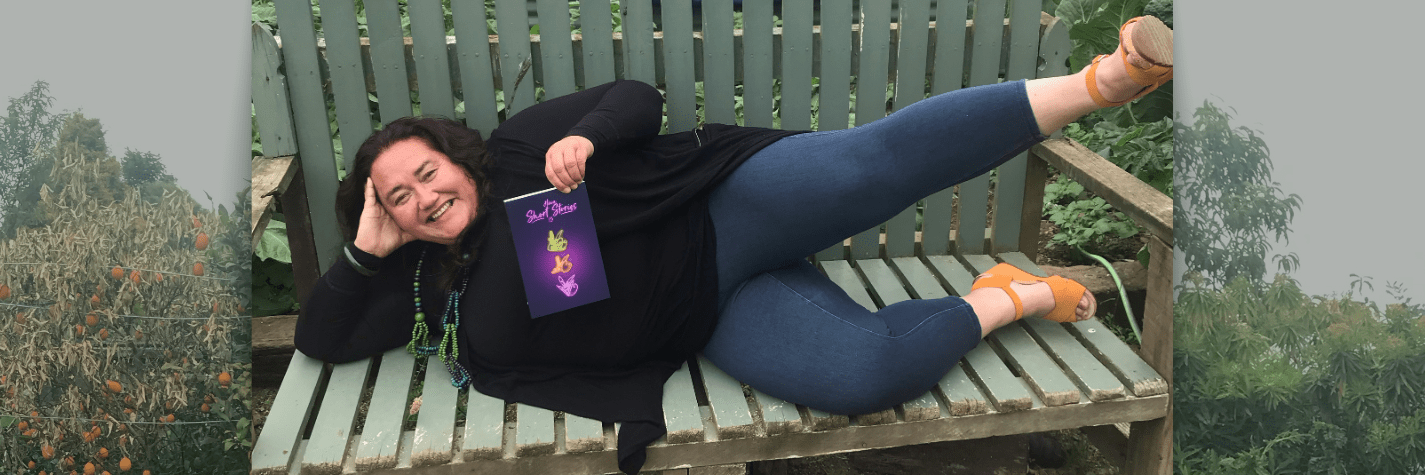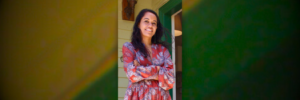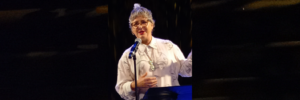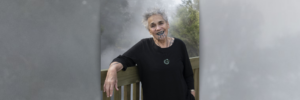
Shelley Burne-Field (Sāmoa, Ngāti Mutunga, Ngāti Rārua, Pākehā) writes fiction, creative non-fiction and poetry. She comes from Te Matau-a-Māui | Hawke’s Bay and is an alum of the University of Auckland’s Master of Creative Writing, as well as the Te Papa Tupu mentoring programme. Her work has appeared in local and international literary journals and anthologies, on Newsroom, E-Tangata and RNZ. Two upper-middle-grade novels are forthcoming from Allen & Unwin. In 2022 she was awarded a Surrey Hotel residency and was the only New Zealand finalist in that year’s Commonwealth Short Story Prize. Her poem ‘Another Brown Face’ won the Poetry in English category of the 2023 Pikihuia Awards. She has hosted Māori and Pasifika writers’ panels at the Hawke’s Bay Readers and Writers Festival, and appeared as a kaituhi at the CHB Readers and Writers’ Festival ‘Reading between the lines.
Congratulations on your recent win at the 2023 Pikihuia Awards! How did it feel when you found out you had won the first ever Poetry in English category?
I was so emotional when somebody text me that night that I’d won – I’m not even sure who it was! We were supposed to drive down that day to the Pikihuia ceremony, but we were at home. My tāne’s brother had just tragically passed away down south, and so it was a time of sadness and grief. When I heard my poem had won, it felt like a beautiful moment. I cried like a pēpi. My son and husband were so lovely, but it also put things in perspective because we’d just lost our brother.
You are a Te Papa Tupu graduate. To what extent has your time in Te Papa Tupu shaped the way you write?
I still keep in touch with some of the 2014 cohort – Jo Kemp Baker is my gurl. I can’t wait for her pukapuka to get out into the world. I also used to keep in touch with the beautiful and talented Robert MacDonald, RIP mātua. They both taught me so much about life and struggle and beauty, and then wearing all of that and being Māori, too. Both are so talented. Those connections with other writers and my mentor at the time, Whiti Hereaka, really were the first tentative steps in thinking – hey maybe I can do this? I got to visit the Auckland Writers Festival and the Sydney Writers Festival and they really helped shape the idea that really famous authors are just ordinary people with a vision of a story. Whiti was such a generous mentor. The programme was a gift, too. I think Te Papa Tupu has gone from strength to strength. I wish every Māori writer could go through it.
What tikanga or kawa do you apply to your writing process?
Taking time. Calling on tūpuna to be with me. Letting the images and the story and the characters come when ready. Reading lots and lots. Letting things go. Looking at things with fresh eyes. Research. Getting others to see the story early and trying not to be an ‘ask-hole’ i.e. don’t ask for help and then ignore what people say. Write anywhere. Meditate. Connect. As Stephen King says, take a dip in the pool, which really means the story is already waiting for you to dive in. Sorry to mix metaphors, but it’s like tuning into a radio signal. Some writers believe we tap into the idea, energetically. As Emma Hislop says – find the heart of your story. My process is to keep dipping, diving, and searching for that heart. Sometimes, I’m too impatient and too egotistical, thinking I’ve got it. Then I have to catch myself, put the story away, and go back for te manawa when it’s ready to be found.
What do you think your tīpuna would think of this poem? What would their reactions be?
I think they would totally get it. I think about my tūpuna who crossed oceans and argued for land rights in pākehā courts and lived and worked where they could make a life for their tamariki. They made friends and reciprocal connections with people who ‘got’ them. We live in a world where we energetically feel empathy and understanding from just a glance, or a recognition of skin colour. And the story goes way beyond our skin tone, of course. Layers of history and meaning live there. The connections are deep and spiritual. It would have been the same for them.
This is the first time that HUIA has published poetry in the Short Stories anthology, from Pikihuia finalists. What does it mean to you to have your poetry published by such an iconic indigenous publisher?
This poetry win is a fantastic next step in my emerging writing career! When you’re a bit like me and haven’t grown up with Te Reo or on a marae, any validation by other Māori is like a religious experience and as though a streak of light, an atua’s sunbeam, has shone down and filled you up with mana. When you say ‘iconic indigenous publisher’ – that’s what HUIA is. So, when it happens, it’s glorious. It’s incredible to feel accepted by one’s peers, and by a community you may have been isolated from through the impacts of Colonisation. Incredible. That poem is literally a lens into an important part of my life, so to win and be judged by an icon like Robert Sullivan and be published by an icon like HUIA Publishers is everything.
What books (or other art forms) influenced you while writing this poem?
I had been reading and writing Flash Fiction which is almost poetry. It is short and your ideas must be concise, precise, pinpoint. It helped. My influence for this poem was my Mum’s experience with my Aunty Lucy – they were the two nurses (they’re both passed now). The story is 100% true. They saw each other at the training hospital in Waipukurau and ran into each others’ arms. Mum was never one to talk about brown or white people, she lived in the provinces in years of assimilation and you just never brought up those distinctions. But her story told me everything I needed to know and relate it to my own experiences and intuition. How we gravitate towards other familiar faces, and the shared experiences behind those faces. At the time I wrote this a couple of years ago, I was in a dazzling depression and in the midst of recovering from childhood trauma, PTSD and anxiety. My mind, I’m sure, was spluttering like a mudpool trying to transform into something bigger, something more clear. I think I was trying to make sense of the past, present, and contemplating whether the future held any space for me. It did. I found other brown faces who helped me find my way. My mum and my tūpuna helped me find my way.
What projects are you working on now or hope to be working on in the future?
I’m excited. I’ve got a bunch of projects. I have a pukapuka called ‘A Christmas Waiata’ coming out shortly! It’s a self-published story based on Dickens’ ‘A Christmas Carol’ and I’ve got a limited print run for Christmas 2023 which I’m only selling in my rohe. I also have a middle-grade pukapuka for 7-12yo about two kāhu sisters. This is coming out in 2024 published by Allen and Unwin, so I’m working on making that as awesome as possible. Also, I’ve just heard I’ve been awarded Te Herenga Waka—Victoria University of Wellington International Institute of Modern Letters (IIML) and Creative New Zealand Emerging Māori Writer in Residence for 2024! Whoop! Whoop! For that I’ve got a story idea set in a future Aotearoa where sea levels have risen as predicted, amongst this is the effects of Artificial General Intelligence and the intersection between the natural world.
What tips do you have for building relationships in the Māori writing community?
Kōrero and be authentic. Reach out. Go to hui and festivals. Join the NZSA who have a new Māori branch. Have realistic expectations. We’re all holding the weight of the world on our shoulders with whānau, tamariki, mahi, as well as holding up our own te whare tapa whā, eh. Hinengaro. Wairua. Whānau. Tinana. Helen Waaka, a writer who lives locally to me, and I formed a friendship based on meeting for coffee, talking about writing (because our husbands were sick of us talking about structure, metaphor and point of view lol). Helen and I have become good friends, we try to improve our te reo, but we understand we can only do all of that when we have capacity and time. We tautoko each other. Read each others’ work, but it’s okay if people are busy. I’ve heard in other parts of Aotearoa, Māori and Pasifika writers have found each other and awhi each other. Ka rawe! I find the more Māori and Pasifika writers I meet and get to know, the more similarities I find, and I also learn so much. I am inspired by them all. And we laugh and cry and gossip about things, just like anyone else. The support in the community is so generous. Of course it is. We’re awesome.
Which works by Māori authors have you read lately that you loved and what did you love about them?
I loved Emma Hislop’s short story collection ‘Ruin’ – I mean, genius really. I like the urban tilt and the deep observation of her stories. Colleen Maria Lenihan’s collection – ‘Kōhine’ – strength and pain and echoes of George Saunders. I also love Kim Breen’s non-fiction. She exposes truth with pure clarity like no other. And Jack Remi Cottrell – his pukapuka ‘Ten Acceptable Acts of Arson’ is excellent – want gothic, wit, and insight? Jack’s work is stunning. And so many more! Cassie Hart. Lee Murray. JP Pomare. The great, Whiti Hereaka. My son has been doing NCEA exams and he’s been reading matua Witi Ihimaera and whaea Patricia Grace – which reintroduced me to ‘In search of Emerald City’ and ‘It used to be green once’. I re-read these stories and the writing is so so so flawless and expert. The escalation is en pointe. The stories have aged gracefully and the messages are still relevant and needed today. My son is in good hands. I do wish more teachers would give their classes a lesson of Tayi and Tusiata, though in the provinces, that ain’t gonna fly just yet *sigh*. One day.
What advice do you have for emerging Māori writers?
Sign up to a writing course. Read the types of books you want to write. Learn Te Reo when you have capacity and energy. Learn the history of this place. Write anywhere and everywhere. Send stuff to competitions. Realise that people want a good story, so throw all your ‘wanky’ pieces in the fire. The best advice I ever got was from Paula Morris: write the story that only you can write. My poem ‘Another Brown Face’ is that. It is personal. Nobody else could have written that poem which was about my Mum, my Aunty Lucy, and me. It was about Aotearoa New Zealand from our eyes, and it was about lots of things that culminated in my mind and my wairua. My tūpuna were around me when I wrote it. They are always there. To emerging Māori writers I say write the story that only you can write. Tell the truth. Say what you want to say. Do it with aroha and rage and comedy and drama and sadness and hope. Let the kupu and the ideas come when they’re ready. And take care of yourself. You’ll be traditionally published, or by an indie publisher, or you’ll publish yourself. All good. It’ll be okay, and what will be will be.




